India
Update Spring ’23
Star Action was founded in 2006, and incorporated Save the Babies which was started by Katie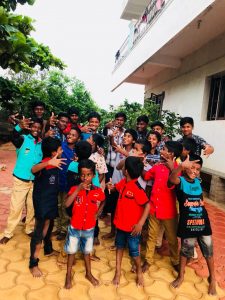 Neil ten years earlier. Kate was only 18 at the time, and she has written below about this and her return to India in the summer of 2019. With the new name ‘The Brighter Life Children’s’ home’, we now care for over 30 under-privileged children in the southernmost state of India, Tamil Nadu.
Neil ten years earlier. Kate was only 18 at the time, and she has written below about this and her return to India in the summer of 2019. With the new name ‘The Brighter Life Children’s’ home’, we now care for over 30 under-privileged children in the southernmost state of India, Tamil Nadu.
The children join a ‘family’ and our commitment to each one is long term, the home remaining as a refuge long after they have left us to pursue careers and raise their own families.
It costs in the region of ten thousand pounds on average to care for each child for the duration of their time with us, (until the end of their education) – far below costs in the West, but a lot for a small charity with no government or corporate assistance. Those, who arrive as babies, could be with us for 20 years before they are qualified to enter into the job marketplace.
We are, of course, totally committed to keeping and supporting each child to their maximum potential, and this is a priority use of our resources. Second only to this is the education of other young people; we continue to underwrite the costs of each of our poor students for school, apprenticeships or university, not only in India, but other countries too. These include Sri Lanka, Bangladesh, Indonesia and Morocco – outstanding students from very poor families are recommended by our Sri Lankan Muslim friend Mr Youssuf (pictured, on the right).
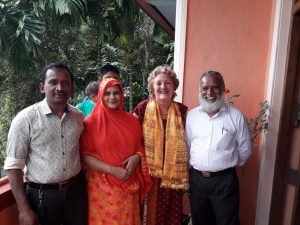 Unlike most charities providing education in these territories we do not specifically only support those from a particular religion. Our students are a mix of Muslim, Christian, Hindu and Buddhist. In our eyes their chosen belief system has no relevance to their need or the backing from Star Action.
Unlike most charities providing education in these territories we do not specifically only support those from a particular religion. Our students are a mix of Muslim, Christian, Hindu and Buddhist. In our eyes their chosen belief system has no relevance to their need or the backing from Star Action.
In 2018, after her visit to the home, Jenny wrote:
It was such a joy to arrive at our Bright Life Home—after two years not there—to see
the wonderful way in which the garden had matured. The photo shows the beautiful fruit trees at the front of the house and the paved area which is ideal for visitors to relax and the children play. Once a month our little ones from the Manjolai tea plantations have a visit from their parents and this provides a lovely area for them to relax and be with the children. At the back of the house the fruit trees have grown well too; this is where washing is done and our hens can roam free. It is a beautiful family home and a delight to see how happy all the children are.”
Older children’s progress
After that visit, Stuart reported on the progress of some of our older children:
Velammal
As we have told you previously, Velammal has been progressing brilliantly with her nursing courses and is now a fully trained eye nurse. She has nearly completed her acupuncture training. Whilst staying there, Stuart and I both enjoyed acupuncture treatments from her as she is required to get as much practice as possible. She is doing really well.
Rani
Rani came to our home as a skinny little teenager suffering badly from TB. Sasees and Richard gave her wonderful care and she has been embraced in the happy family life. Over the years Sasees has taught her many house-keeping skills, including cooking, and she now looks after everyone—washing, ironing, cleaning, cooking—and is so much loved by us all. Well done, dear Rani.
Marcus
Marcus has been with us since birth and is now nearly 18 and taking his final exams be-fore going on to study at college. He is expected to do well and is keen to study pharmaceutical medicine, with plans to find work in a pharmacy or laboratory later.
Marcus has grown into a fine young man and is re-ally helpful in the Home and in looking after some of the younger boys.
Muthu
Muthu is a tall and very likeable lad. He is effectively an orphan, having been mistreated by several members of his family. He is practical rather than academic and, when he finishes school in April, we hope he will stay on as Richard’s right-hand man and maintenance assistant.
Kirthick
Kirthick is in the first year (of 5) at the State’s principal Law School in Chennai. His ambition is to re-turn to Tirunelveli to practice law and also help the Children’s Home.
Senior Boys
Several of those over 14 years are playing badminton at a local club and doing well, with a recent supply of racquets and shuttlecocks sent by a kind supporter.
Kate returns to India…
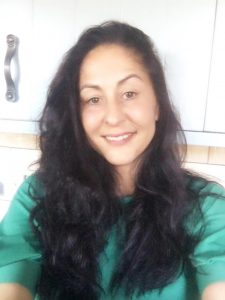 In June this year (2019), Kate’s own family commitments have allowed her to return to visit Brighter Life – on her return she will write about her time and the changes she has seen there.
In June this year (2019), Kate’s own family commitments have allowed her to return to visit Brighter Life – on her return she will write about her time and the changes she has seen there.
Our wonderful new Brighter Life home (formerly STB)
Thanks to the extraordinary and unstinting generosity of our supporters we have been able to move in to our lovely, purpose built new home this year. Sasees wrote:
I thank you very much for all the trustees and supporters for who had extended their heart and money for STB family to have a amazing house for our children.
We and our children are very happy to have a house of our own. Our children are proud to say that they have new house and never change. This house is so peaceful for us all. We have such a great view near by our house. We can still adopt some more children in our new house.
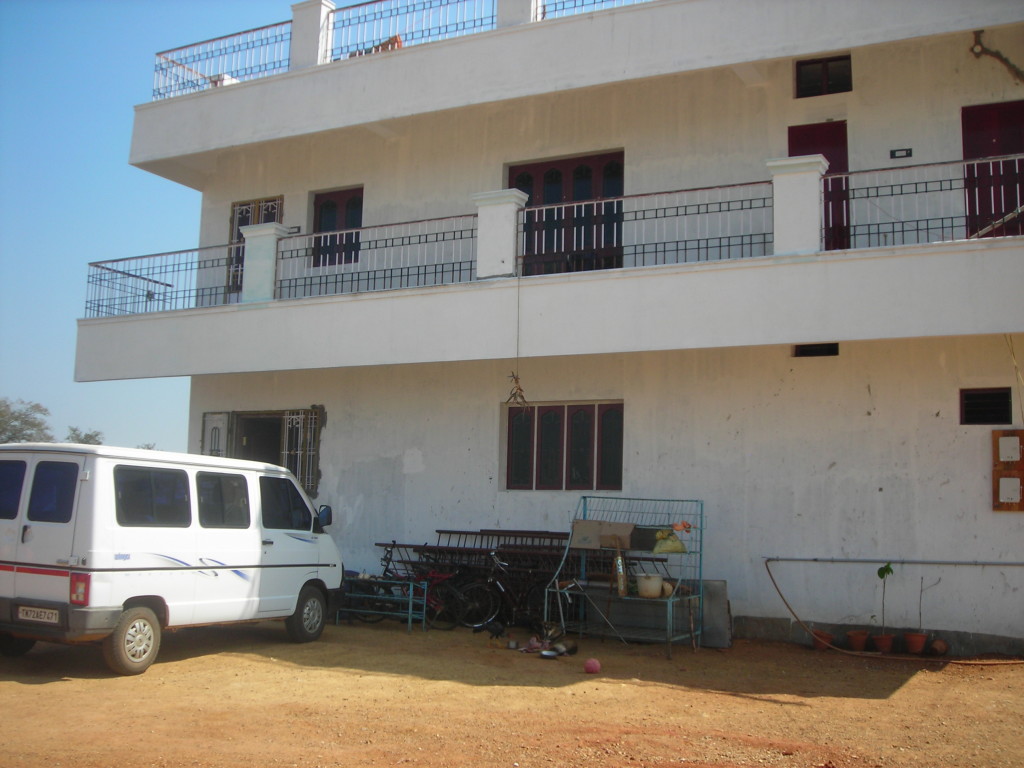

HOW SAVE THE BABIES STARTED
by Kate Neil
In 1995, I went to South India to help out at a Children’s Home in the lower Palani Hills in Tamil Nadu.
I was 18 years old and spent much of my time helping the Home’s Nurse in her work caring for the children, and in the evenings I assisted her to distribute polio vaccine to others in many of the local villages. Shanthy and I became good friends and shared concerns of the difficult conditions in which the very poor families were trying to bring up their children.
In some parts of Tamil Nadu the pressure to produce only male children, because of the dowry system of marriage, is so great that female infanticide is still practised. This was a great shock to me and I tried to persuade the children’s home where I was staying to begin to take tiny babies which could be vulnerable to this practise. This proved not to be an option.
Finding this too desperate a situation to ignore, Shanthy and I decided to launch our own society to care for these vulnerable babies, whose families may have contemplated disposing of them.
In order to operate a charity in India we had to register our new organisation with the Registrar of Societies in India, and it had to be administered by a local management committee. In addition, in order to raise and dispense funds from the UK and Europe, we registered the ‘Save the Babies Society’ with the Charities Commission in Britain.
Together in 1996, Shanthy and I moved to Palayamkottai and found a suitable house to rent on a residential estate in this town near the southernmost point of India.
In the first 6 months I went through the process of getting known in the local area. This included a certain amount of press coverage because of the novelty of two women starting anything in South India – this being a wholly male orientated society at the time. Many local officials found it comical that a Tamil woman and a 19 year old British girl could possibly run a Children’s society.
In practice we have taken babies from a variety of desperate situations. These include potential female infanticide victims, the children of parents killed in community fighting, abandoned babies and two whose mothers have committed suicide.
Shanthy has since moved on and we now have two new Care Managers, Richard and Sasees who are totally committed to their role and have consolidated this large family (now 30) as a happy and health unit.
DELIGHTFUL DAILY ROUTINE
Jenny writes:
One of the things I love so much about my visits to our Save the Babies Home is to experience the perfect blend of love and discipline which Richard & Sasees, our house parents, have established. Our twenty-four children are secure in the love and care they receive. There is no favouritism of their own two children—all are together part of the family. I believe part of their security lies in the regular daily routine:
6.30am Waking, washing and dressing
7.00am All seated (on the floor of course with school bags in front of them) for an hour of study.
A recent innovation has been ‘pairing’ of the children for study, with an older, more accomplished child seated with a younger one, to help and encourage them.
8.00am Breakfast (usually home cooked ‘idlies’—a Tamil Nadu dish made of rice and what Sasees calls ‘chutney’—to us a delicious mixture of spicey chopped vegetables!). Sometimes the children enjoy boiled rice and wadai – a small savourycake, but a real treat is “dosai”; a flat rice-based pancake, eaten with two separate types of chutney. (This is fried and time-consuming to make for our 27 strong family.) Come and stay on our “cooking course” (see later) and learn to make all these dishes that are almost unknown in the West outside Tamil communities.
Then it is school time. As our family has a big age range, they attend a number of different schools. Education is very important in India and whatever their ability all the children are encouraged to work very hard. Most are taught in ‘Tamil’ schools (the local language in Tamil Nadu, the state where our children’s home is).
A few go to ‘English Medium Schools’, where everything is taught in English. At a young age the children are all tested in simple English. It is a tribute to Sasees (formerly an English teacher), that the two children she has had care of since they were tiny babies, Poppy and Padmini, both go to these ‘English Medium Schools’.
The school day is long in India and unless there is extra studying they are not home until 4.30pm. (They have a rice and curry lunch provided at school.) Then there are snacks
and change into play clothes. Our new home has wonderful scope for outdoor play and Richard has an aspiring STB Cricket Team! Whilst I was there this time, two of the boys made the highest flying kite I have ever seen out of newspaper and string!
It gets dark in this part of India around 6.45pm. The children all come in then to the large first floor room—big enough for them all to sit in their part for study time again.
8.00pm Evening meal in the downstairs room adjoining the new tiled kitchen is at 8.00pm. I loved the way the children have been taught to say a simple thank-you prayer before every meal. Sasees does all the cooking, helped by Rani who is now 20 years, having come to us as a skinny illiterate teenager with TB and no future. (See separate piece about Tamil Nadu cooking courses!)
8.45pm Bed time follows soon after supper on weekdays. At the weekend the regime is more relaxed of course, including plenty of play, some TV, and occasional Sunday outings—with all the family piling into one minibus (bought some years ago thanks to the generosity of one of our supporters).
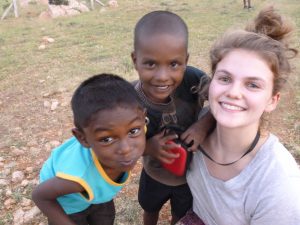
VISITORS TO OUR BRIGHTER LIFE HOME
GAP YEAR STUDENTS
In January 2014 we welcomed our first ‘gap year’ students. Ellie and Natalie stayed a month with us—our first experiment. Their visit was a great success (see their account and photos), so we want to offer this opportunity to others. Our charge for staying is just £10 a day full board and our visitors become part of the family (if they wish) joining in the daily life of our 24 children, playing and dancing, learning about ‘real life in India’—quite a different experience from being a tourist.
Please email or phone Stuart if you are interested in knowing more. 0044 (0)1395 568064 stuartneil2005@gmail.com
TAMIL NADU COOKERY LESSONS
Sasees is a fantastic cook and has agreed to give one-to-one lessons on authentic Tamil Nadu cooking—did you see Rick Stein’s ‘Travelling through India’ TV series? In a week long stay up to 3 two-hour lessons can be arranged for an additional fee of £60.
ONE DAY TRIPS
Also possible is a one day trip to the southern most point of India, to see the amazing statue and memorial to Vivikenanda, or to a spectacular waterfall. (Cost of these trips are £20 per person, including picnic lunch.)
If you are interested in finding out more, do email Stuart.
Ellie, our gap year student, writes:
Our time at save the babies was one of the most amazing experiences. Richard, Sasees and all the children made us feel so welcome and by the end we felt like we were part of their family. During the day, whilst the children were at school, Richard and Sasees would take us into their local town to do different activities. We went to temples, visited the children’s schools, went shopping and through doing this we learnt so much about their culture. In the evenings we would play with the children then help the younger children with their English during study time; we taught them lots of English songs! The weekends and holidays were big highlights for us, especially celebrating their festival Pongal and getting to wear saris! We tried to organise different activities to do with them every weekend including a sports day; all the children loved it. They also organised day trips for us during the holidays. We went on a big outing one day visiting an amazing waterfall, a huge bridge and the beach! One of our favourite things to do with the children was dancing. All the children loved dancing to their favourites Indian and English songs and we were more than happy to join in!
STB is just an incredible organisation and the amount of effort that Richard and Sasees put in to making each child feel part of their family is amazing. Each child is so special in their own way and we will miss them all so much. We are so grateful for being able to have an insight into this charity. Thank you everyone at STB!



























